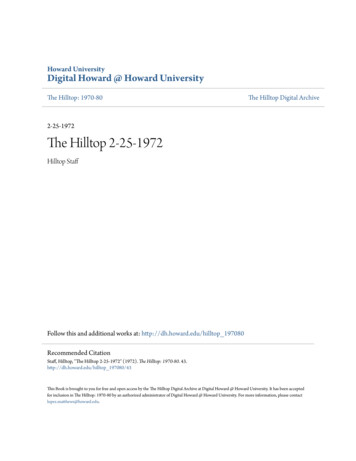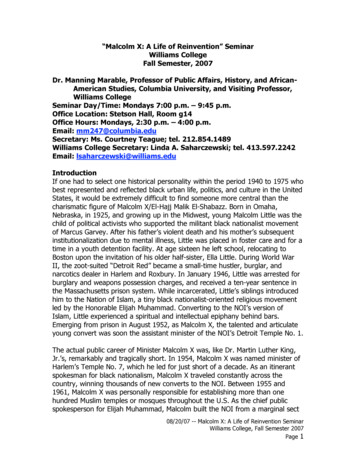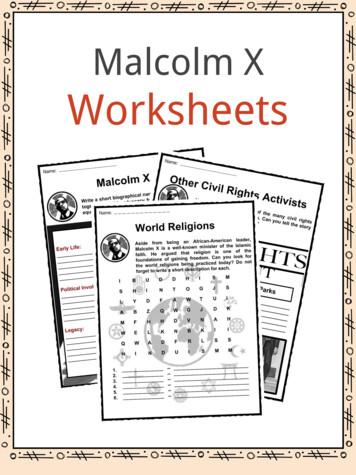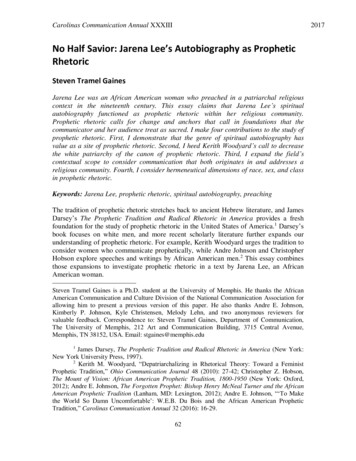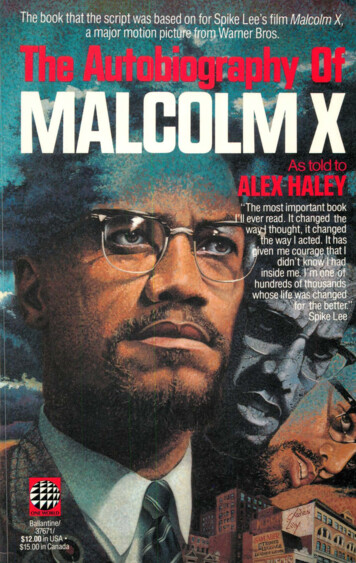
Transcription
THE AUTOBIOGRAPHY OFMALCOLM Xwith the assistance of Alex HaleyIntroduction by M. S. HandlerEpilogue by Alex HaleyBallantine Books New York
Sale of this book without a front cover may be unauthorized. If this book is coverless,it may have been reported to the publisher as "unsold or destroyed" and neither theauthor nor the publisher may have received payment for it.Copyright 1964 by Alex Haley and Malcolm XCopyright 1965 by Alex Haley and Betty ShabazzIntroduction copyright 1965 by M. S. HandlerAll rights reserved under International and Pan-American CopyrightConventions. Published in the United States by Ballantine Books, adivision of Random House, Inc., New York, and simultaneouslyin Canada by Random House of Canada Limited, Toronto.T his edition published by arrangement with Grove Press, Inc."On Malcolm X" by Ossie Davis previously appeared in Group magazineand is reprinted by permission.Library of Congress Catalog Card Number: 91-93124ISBN: 0-345-37671-4Cover design by Kristine V. MillsCover painting by Charles LillyManufactured in the United States of AmericaFirst Ballantine Books Edition: June 1973First Ballantine Books Trade Edition: February 1992
This book I dedicate to my beloved wife Bettyand to our children whose understanding and whose sacrificesmade it possible for me to do my work.
ightmareMascot" Homeboy"LauraHarlemiteDetroit RedHustlerTrappedCaughtSatanSavedSaviorMinister Malcolm XBlack MuslimsIcarusOutMeccaEl-Hajj Malik El-Shabazz1965Alex Haley : EpilogueOssie Davis : On Malcolm 419441524
M. S. HANDLERI NTRO D U CTI O NTheSunday before he was to officially announce his rupturewith Elijah Muhammad, Malcolm X came to my home to dis cuss his plans and give me some necessary documentation .Mrs . Handler had never met Malcolm before this fateful visit.She served us coffee and cakes while Malcolm spoke in thecourteous, gentle manner that was his in private. It was obviousto me that Mrs . Handler was impressed by Malcolm. His per sonality fil led our living room .Malcolm 's attitude was that of a man who had reached acrossroads in his life and was making a choice under an innercompulsion . A wistful smile illuminated his countenance fromtime to time-a smile that said many things. I felt uneasy be cause Malcolm was evidently trying to say something which hispride and dignity prevented him from expressing. I sensed thatMalcolm was not confident he would succeed in escaping fromthe shadowy world which had held him in thrall.Mrs . Handler was quiet and thoughtful after Malcolm's de parture. Looking up suddenly, she said :" You know, it was like having tea with a black panther. "The description startled me. The black panther is an aristo crat in the animal kingdom. He is beautiful. He is dangerous.As a man, Malcolm X had the physical bearing and the innerself-confidence of a born aristocrat. And he was potentially dan gerous . No man in our time aroused fear and hatred in the whiteman as did Malcolm, because in him the white man sensed ani mplacable foe who could not be had for any price-a man un reservedly committed to the cause of liberating the black manix
XTHE AUTOBIOGRAPHY OF MALCOLM Xin American society rather than integrating the black man intothat society.My first meeting with Malcolm X took place in March 1963in the Muslim restaurant of Temple Number Seven on LenoxAvenue. I had been assigned by The New York Times to inves tigate the growing pressures within the Negro community. Thirtyyears of experience as a reporter in Western and Eastern Europehad taught me that the forces in a developing social struggle arefrequently buried beneath the visible surface and make them selves felt in many ways long before they burst out into theopen. These generative forces make themselves felt through thepower of an idea long before their organizational forms canopenly challenge the establishment. It is the merit of Europeanpolitical scientists and sociologists to give a high priority to thepower of ideas in a social struggle. In the United States, it isour weakness to confuse the numerical strength of an organi zation and the publicity attached to leaders with the germinatingforces that sow the seeds of social upheaval in our community.In studying the growing pressures within the Negro com munity, I had not only to seek the opinions of the establishedleaders of the civil rights organizations but the opinions of thoseworking in the penumbra of the movement-"underground , "s o to speak. This i s why I sought out Malcolm X, whose ideashad reached me through the medium of Negro integrationists.Their thinking was already reflecting a high degree of nascentNegro nationalism .I did not know what to expect as I waited for Malcolm. I wasthe only white person in the restaurant, an immaculate estab l ishment tended by somber, handsome, uncommunicative Ne groes. Signs reading "Smoking Forbidden" were pasted on thehighly polished mirrors. I was served coffee but became uneasyin this aseptic, silent atmosphere as time passed. Malcolm fi nally arrived. He was very tal l , handsome, of impressive bear ing. His skin had a bronze hue.I rose to greet him and extended my hand . Malcolm 's handcame up slowly. I had the impression it was difficult for him to
INTRODUCTIONXitake my hand, but, noblesse oblige, he did. Malcolm then did acurious thing which he always repeated whenever we met inpublic in a restaurant in New York or Washington . He askedwhether I would mind if he took a seat facing the door. I hadhad similar requests put to me in Eastern European capitals.Malcolm was on the alert, he wished to see every person whoentered the restaurant. I quickly realized that Malcolm con stantly walked in danger.We spoke for more than three hours at this first encounter.His views about the white man were devastating, but at no timedid he transgress against my own personality and make me feelthat I, as an individual, shared in the guilt. He attributed thedegradation of the Negro people to the white man . He de nounced integration as a fraud. He contended that if the leadersof the established civil rights organizations persisted, the socialstruggle would end in bloodshed because he was certain thewhite man would never concede full integration. He arguedthe Muslim case for separation as the only solution in which theNegro could achieve his own identity, develop his own culture,and lay the foundations for a self-respecting productive com munity. He was vague about where the Negro state could beestablished.Malcolm refused to see the impossibility of the white manconceding secession from the United States; at this stage in hiscareer he contended it was the only solution. He defended Islamas a religion that did not recognize color bars . He denouncedChristianity as a religion designed for slaves and the Negroclergy as the curse of the black man, exploiting him for theirown purposes instead of seeking to liberate him , and acting ashandmaidens of the white community in its determination tokeep the Negroes in a subservient position.During this first encounter Malcolm also sought to enlightenme about the Negro mentality. He repeatedly cautioned me tobeware of Negro affirmations of good will toward the whiteman. He said that the Negro had been trained to dissemble andconceal his real thoughts, as a matter of survival . He argued
XiiTHE AUTOBIOGRAPHY OF MALCOLM Xthat the Negro only tells the white man what he believes thewhite man wishes to hear, and that the art of dissemblingreached a point where even Negroes cannot truthfully say theyunderstand what their fellow Negroes believe. The art of decep tion practiced by the Negro was based on a thorough under standing of the white man's mores, he said; at the same timethe Negro has remained a closed book to the white man, whohas never displayed any interest in understanding the Negro.Malcolm's exposition of his social ideas was clear andthoughtful , if somewhat shocking to the white initiate, but mostdisconcerting in our talk was Malcolm's belief in Elijah Muham mad's history of the origins of man, and in a genetic theorydevised to prove the superiority of black over white-a theorystunning to me in its sheer absurdity.After this first encounter, I realized that there were two Mal colms-the private and the public person. His public perfor mances on television and at meeting halls produced an almostterrifying effect. His implacable marshaling of facts and his logichad something of a new dialectic, diabolic in its force. Hefrightened white television audiences, demolished his Negro op ponents, but elicited a remarkable response from Negro audi ences . Many Negro opponents in the end refused to make anypublic appearances on the same platform with him. The trou bled white audiences were confused, disturbed, felt themselvesthreatened. Some began to consider Malcolm evil incarnate.Malcolm appealed to the two most disparate elements in theNegro community-the depressed mass, and the galaxy of Ne gro writers and artists who have burst on the American scenein the past decade. The Negro middle class-the Negro "estab lishment' ' -abhorred and feared Malcolm as much as he de spised it.The impoverished Negroes respected Malcolm in the waythat wayward children respect the grandfather image. It wasalways a strange and moving experience to walk with Malcolmin Harlem. He was known to all . People glanced at him shyly.Sometimes Negro youngsters would ask for his autograph. It
INTRODUCTIONXiiialways seemed to me that their affection for Malcolm was in spired by the fact that although he had become a national figure,he was still a man of the people who, they felt, would neverbetray them. The Negroes have suffered too long from betrayalsand in Malcolm they sensed a man of mission. They knew hisorigins, with which they could identify. They knew his criminaland prison record, which he had never concealed. They lookedupon Malcolm with a certain wonderment. Here was a man,who had come from the lower depths which they still inhabited,who ·had triumphed over his own criminality and his own ig norance to become a forceful leader and spokesman, an uncom promising champion of his people.Although many could not share his Muslim religious beliefs,they found in Malcolm's puritanism a standing reproach to theirown lives. Malcolm had purged himself of all the ills that afflictthe depressed Negro mass: drugs, alcohol, tobacco, not to speakof criminal pursuits . His personal life was impeccable-of apuritanism unattainable for the mass . Human redemption Malcolm had achieved it in his own lifetime, and this was knownto the Negro community.In his television appearances and at public meetings Malcolmarticulated the woes and the aspirations of the depressed Negromass in a way it was unable to do for itself. When he attackedthe white man, Malcolm did for the Negroes what they couldn'tdo for themselves-he attacked with a violence and anger thatspoke for the ages of misery. It was not an academic exerciseof just giving hell to "Mr. Charlie. "Many of the Negro writers and artists who are national fig ures today revered Malcolm for what they considered his ruthlesshonesty in stating the Negro case, his refusal to compromise,and his search for a group identity that had been destroyed bythe white man when he brought the Negroes in chains fromAfrica. The Negro writers and artists regarded Malcolm as thegreat catalyst, the man who inspired self-respect and devotionin the downtrodden millions .A group of these artists gathered one Sunday in my home,
XiYTHE AUTOBIOGRAPHY OF MALCOLM Xand we talked about Malcolm. Their devotion to him as a manwas moving. One said : "Malcolm will never betray us. We havesuffered too much from betrayals in the past . "Malcolm's attitude toward the white man underwent a markedchange in 1964-a change that contributed to his break withElijah Muhammad and his racist doctrines. Malcolm's meteoriceruption on the national scene brought him into wider contactwith white men who were not the "devils" he had thought theywere. He was much in demand as a speaker at student forumsin Eastern universities and had appeared at many by the end ofhis short career as a national figure. He always spoke respect fully and with a certain surprise of the positive response ofwhite students to his lectures.A second factor that contributed to his conversion to widerhorizons was a growing doubt about the authenticity of ElijahMuhammad's version of the Muslim religion-a doubt that grewinto a certainty with more knowledge and more experience.Certain secular practices at the Chicago headquarters of ElijahMuhammad had come to Malcolm's notice and he was pro foundly shocked.Finally, he embarked on a number of prolonged trips toMecca and the newly independent African states through thegood offices of the representatives of the Arab League in theUnited States. It was on his first trip to Mecca that he came tothe conclusion that he had yet to discover Islam.Assassins' bullets ended Malcolm's career before he was ableto develop this new approach , which in essence recognized theNegroes as an integral part of the American community-a farcry from Elijah Muhammad's doctrine of separation. Malcolmhad reached the midpoint in redefining his attitude to this coun try and the white-black relationship. He no longer inveighedagainst the United States but against a segment of the UnitedStates represented by overt white supremacists in the South andcovert white supremacists in the North.It was Malcolm's intention to raise Negro militancy to a newhigh point with the main thrust aimed at both the Southern and
INTRODUCTIONXVNorthern white supremacists. The Negro problem, which he hadalways said should be renamed "the white man's problem , " wasbeginning to assume new dimensions for him in the last monthsof his life.To the very end, Malcolm sought to refashion the brokenstrands between the American Negroes and African culture. Hesaw in this the road to a new sense of group identity, a self conscious role in history, and above all a sense of man's ownworth which he claimed the white man had destroyed in theNegro.American autobiographical literature is filled with numerousaccounts of remarkable men who pulled themselves to the sum mit by their bootstraps. Few are as poignant as Malcolm's mem oirs . As testimony to the power of redemption and the force ofhuman personality, the autobiography of Malcolm X is a reve lation.New York, June 1965
THE AUTOBI OGRAPHY OFMALCOLM X
CHAPTER 1N I G HTMAREWhen my mother was pregnant with me, she told m e later, aparty of hooded Ku Klux Klan riders galloped up to our homein Omaha, Nebraska, one night. Surrounding the house, bran dishing their shotguns and rifles, they shouted for my father tocome out. My mother went to the front door and opened it.Standing where they could see her pregnant condition, she toldthem that she was alone with her three small children, and thatmy father was away, preaching, in Milwaukee. The Klansmenshouted threats and warnings at her that we had better get outof town because "the good Christian white people" were notgoing to stand for my father's "spreading trouble" among the"good" Negroes of Omaha with the "back to Africa" preach ings of Marcus Garvey.My father, the Reverend Earl Little, was a Baptist minister,a dedicated organizer for Marcus Aurelius Garvey's U . N . I . A .(Universal Negro Improvement Association) . With the help ofsuch disciples as my father, Garvey, from his headquarters inNew York City 's Harlem, was raising the banner of black-racepurity and exhorting the Negro masses to return to their ances tral African homeland-a cause which had made Garvey themost controversial black man on earth .Still shouting threats , the Klansmen finally spurred theirhorses and galloped around the house, shattering every windowpane with their gun butts . Then they rode off into the night,their torches flaring, as suddenly as they had come.My father was enraged when he returned. He decided to waituntil I was born-which would be soon-and then the family3
4THE AUTOBIOGRAPHY OF MALCOLM Xwould move. I am not sure why he made this decision, for hewas not a frightened Negro, as most then were, and many stillare today. My father was a big, six-foot-four, very black man .He had only one eye. How he had lost the other one I havenever known. He was from Reynolds, Georgia, where he hadleft school after the third or maybe fourth grade. He believed,as did Marcus Garvey, that freedom, independence and self respect could never be achieved by the Negro in America, andthat therefore the Negro should leave America to the white manand return to his African land of origin. Among the reasons myfather had decided to risk and dedicate his life to help dissem inate this philosophy among his people was that he had seenfour of his six brothers die by violence, three of them killed bywhite men, including one by lynching . What my father couldnot know then was that of the remaining three, including him self, only one, my Uncle Jim, would die in bed, of naturalcauses. Northern white police were later to shoot my UncleOscar. And my father was finally himself to die by the whiteman's hands.It has always been my belief that I, too, will die by violence.I have done all that I can to be prepared.I was my father's seventh child. He had three children by aprevious marriage-Ella, Earl , and Mary, who lived in Boston.He had met and married my mother in Philadelphia, where theirfirst child, my oldest full brother, Wilfred, was born. Theymoved from Philadelphia to Omaha, where Hilda and then Phil bert were born.I was next in line. My mother was twenty-eight when I wasborn on May 19, 1925 , in an Omaha hospital . Then we movedto M ilwaukee, where Reginald was born. From infancy, he hadsome kind of hernia condition which was to handicap him phys ically for the rest of his life.Louise Little, my mother, who was born in Grenada, in theBritish West Indies, looked like a white woman. Her father waswhite. She had straight black hair, and her accent did not soundlike a Negro's. Of this white father of hers, I know nothing
NIGHTMARE5except her shame about it. I remember hearing her say she wasglad that she had never seen him. It was, of course, becauseof him that I got my reddish-brown "mariny " color of skin,and my hair of the same color. I was the lightest child in ourfamily. (Out in the world later on, in Boston and New York, Iwas among the millions of Negroes who were insane enough tofeel that it was some kind of status symbol to be light complexioned-that one was actually fortunate to be born thus.But, still later, I learned to hate every drop of that white rapist'sblood that is in me.)Our family stayed only briefly in Milwaukee, for my fatherwanted to find a place where he could raise our own food andperhaps build a business. The teaching of Marcus Garveystressed becoming independent of the white man. We went next,for some reason, to Lansing, Michigan . My father bought ahouse and soon , as had been his pattern, he was doing free lance Christian preaching in local Negro Baptist churches, andduring the week he was roaming about spreading word of Mar cus Garvey.He had begun to lay away savings for the store he had alwayswanted to own when, as always, some stupid local Uncle TomNegroes began to funnel stories about his revolutionary beliefsto the local white people. This time, the get-out-of-town threatscame from a local hate society called The Black Legion. Theywore black robes instead of white. Soon, nearly everywhere myfather went, Black Legionnaires were reviling him as an ' 'up pity n igger' ' for wanting to own a store, for living outside theLansing Negro district, for spreading unrest and dissentionamong "the good niggers. "As in Omaha, my mother was pregnant again, this time withmy youngest sister. Shortly after Yvonne was born came then ightmare n ight in 1929, my earliest vivid memory. I rememberbeing suddenly snatched awake into a frightening confusion ofpistol shots and shouting and smoke and flames . My father hadshouted and shot at the two white men who had set the fire andwere running away. Our home was burning down around us.
6THE AUTOBIOGRAPHY OF MALCOLM XWe were lunging and bumping and tumbling all over each othertrying to escape. My mother, with the baby in her arms, justmade it into the yard before the house crashed in, showeringsparks. I remember we were outside in the night in our under wear, crying and yelling our heads off. The white police andfiremen came and stood around watching as the house burneddown to the ground .My father prevailed on some friends to clothe and house ustemporarily; then he moved us into another house on the out skirts of East Lansing. In those days Negroes weren't allowedafter dark in East Lansing proper. There's where Michigan StateUniversity is located; I related all of this to an audience ofstudents when I spoke there in January, 1963 (and had the firstreunion in a long while with my younger brother, Robert, whowas there doing postgraduate studies in psychology). I told themhow East Lansing harassed us so much that we had to moveagain, this time two miles out of town, into the country. Thiswas where my father built for us with his own hands a four room house. This is where I really begin to remember things this home where I started to grow up.After the fire, I remember that my father was called in andquestioned about a permit for the pistol with which he had shotat the white men who set the fire. I remember that the policewere always dropping by our house, shoving things around, "justchecking" or " looking for a gun. " The pistol they were lookingfor-which they never found, and for which they wouldn't issuea permit-was sewed up inside a pillow. My father's .22 rifleand his shotgun, though, were right out in the open; everyonehad them for hunting birds and rabbits and other game.After that, my memories are of the friction between my fatherand mother. They seemed to be nearly always at odds. Some times my father would beat her. It might have had something todo with the fact that my mother had a pretty good education.Where she got it I don't know. But an educated woman, I sup pose, can't resist the temptation to correct an uneducated man.
NIGHTMARE7Every now and then, when she put those smooth words on him,he would grab her.My father was also belligerent toward all of the children,except me. The older ones he would beat almost savagely if theybroke any of his rules-and he had so many rules it was hardto know them all. Nearly all my whippings came from mymother. I 've thought a lot about why. I actually believe that asanti-white as my father was, he was subconsciously so afflictedwith the white man's brainwashing of Negroes that he inclinedto favor the l ight ones, and I was his lightest child. Most Negroparents in those days would almost instinctively treat any lighterchildren better than they did the darker ones. It came directlyfrom the slavery tradition that the "mulatto , " because he wasvisibly nearer to white, was therefore ' 'better. ' 'My two other images of my father are both outside the home.One was his role as a Baptist preacher. He never pastored inany regular church of his own; he was always a ' 'visitingpreacher. " I remember especially his favorite sermon : "Thatl ittle black train is a-comin' . . . an ' you better get all yourbusiness right! ' ' I guess this also fit his association with theback-to-Africa movement, with Marcus Garvey 's "Black TrainHomeward . " My brother Philbert, the one just older than me,loved church, but it confused and amazed me. I would sitgoggle-eyed at my father jumping and shouting as he preached,with the congregation jumping and shouting behind him, theirsouls and bodies devoted to singing and praying. Even at thatyoung age, I just couldn't believe in the Christian concept ofJesus as someone divine. And no religious person, until I wasa man in my twenties-and then in prison-could tell me any thing. I had very little respect for most people who representedrel igion.It was i n his role as a preacher that my father had most con tact with the Negroes of Lansing . Believe me when I tell youthat those Negroes were in bad shape then. They are still in badshape-though in a different way. By that I mean that I don'tknow a town with a higher percentage of complacent and mis-
8THE AUTOBIOGRAPHY OF MALCOLM Xguided so-called "middle-class" Negroes-the typical status symbol-oriented, integration-seeking type of Negroes. Just re cently, I was standing in a lobby at the United Nations talkingwith an African ambassador and his wife, when a Negro cameup to me and said, "You know me? " I was a little embarrassedbecause I thought he was someone I should remember. It turnedout that he was one of those bragging, self-satisfied, "middle class" Lansing Negroes. I wasn't ingratiated. He was the typewho would never have been associated with Africa, until the fadof having African friends became a status-symbol for ' 'middle class" Negroes .Back when I was growing up, the "successful" Lansing Ne groes were such as waiters and bootblacks. To be a janitor atsome downtown store was to be highly respected. The real"elite , " the "big shots, " the "voices of the race , " were thewaiters at the Lansing Country Club and the shoeshine boys atthe state capitol. The only Negroes who really had any moneywere the ones in the numbers racket, or who ran the gamblinghouses, or who in some other way lived parasitically off thepoorest ones, who were the masses. No Negroes were hiredthen by Lansing's big Oldsmobile plant, or the Reo plant. (Doyou remember the Reo? It was manufactured in Lansing, andR. E. Olds, the man after whom it was named, also lived inLansing. When the war came along, they hired some Negrojanitors.) The bulk of the Negroes were either on Wel fare, orW . P . A. , or they starved.The day was to come when our family was so poor that wewould eat the hole out of a doughnut; but at that time we weremuch better off than most town Negroes. The reason was thatwe raised much of our own food out there in the country wherewe were. We were much better off than the town Negroes whowould shout, as my father preached, for the pie-in-the-sky andtheir heaven in the hereafter while the white man had his hereon earth.I knew that the collections my father got for his preachingwere mainly what fed and clothed us, and he also did other odd
NIGHTMARE9jobs, but still the image of him that made me proudest was hiscrusading and militant campaigning with the words of MarcusGarvey. As young as I was then, I knew from what I overheardthat my father was saying something that made him a ' 'tough' 'man. I remember an old lady, grinning and saying to my father," You're scaring these white folks to death! "One of the reasons I 've always felt that my father favored mewas that to the best of my remembrance, it was only me that hesometimes took with him to the Garvey U . N . I . A . meetingswhich he held quietly in different people's homes . There werenever more than a few people at any one time-twenty at most.But that was a lot, packed into someone's l iving room . I noticedhow differently they all acted, although sometimes they werethe same people who jumped and shouted in church. But inthese meetings both they and my father were more intense, moreintelligent and down to earth. It made me feel the same way.I can remember hearing of ' 'Adam driven out of the gardeninto the caves of Europe, " "Africa for the Africans, " " Ethio pians, Awake! ' ' And my father would talk about how it wouldnot be much longer before Africa would be completely run byNegroes-"by black men , " was the phrase he always used. "Noone knows when the hour of Africa's redemption cometh. It isi n the wind. It is coming. One day, like a storm, it will behere . "I remember seeing the big, shiny photographs of MarcusGarvey that were passed from hand to hand. My father had abig envelope of them that he always took to these meetings. Thepictures showed what seemed to me m i l l ions of Negroesthronged in parade behind Garvey riding in a fine car, a bigblack man dressed in a dazzling uniform with gold braid on it,and he was wearing a thrilling hat with tall plumes. I rememberhearing that he had black followers not only in the United Statesbut all around the world, and I remember how the meetingsalways closed with my father saying, several times, and the peo ple chanting after him, " Up, you mighty race, you can accom plish what you will ! ' '
10THE AUTOBIOGRAPHY O F MALCOLM XI have never understood why, after hearing as much as I didof these kinds of things, I somehow never thought, then, of theblack people in Africa. My image of Africa, at that time, wasof naked savages, cannibals, monkeys and tigers and steamingjungles .My father would drive in his old black touring car, sometimestaking me, to meeting places all around the Lansing area. Iremember one daytime meeting (most were at n ight) in the townof Owosso, forty miles from Lansing, which the Negroes called"White City . " (Owosso's greatest claim to fame is that it is thehome town of Thomas E. Dewey.) As in East Lansing, no Ne groes were allowed on the streets there after dark-hence thedaytime meeting . In point of fact, in those days lots of Michigantowns were like that. Every town had a few "home" Negroeswho lived there. Sometimes it would be just one family, as inthe nearby county seat, Mason, which had a single Negro fam ilynamed Lyons. Mr. Lyons had been a famous football star atMason High School , was highly thought of in Mason, andconsequently he now worked around that town in menial jobs .My mother at this time seemed to be always working cooking, washing, ironing, cleaning, and fussing over us eightchildren. And she was
X THE AUTOBIOGRAPHY OF MALCOLM X in American society rather than integrating the black man into that society. My first meeting with Malcolm X took place in March 1963 in the Muslim restaurant of Temple Number Seven on Lenox Avenue. I had been assigned by The New York Times to inves tigate the growing pressures within the Negro community. Thirty





